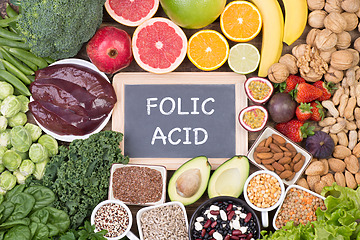What is folic acid? Does taking folic acid increase the chances of pregnancy? How Much Folic Acid Should You Take? When should you start taking folic acid? Many such problems are often referred to our website, so this article is reserved for them.
Folic acid (Folic acid/Vitamin B9) is a vitamin that should be obtained from our food. A woman hoping to become pregnant should get at least 400 micrograms of folic acid per day. Foods like green leafy vegetables, legumes, oranges, cashews, nuts like beans, peas and poultry usually contain folic acid, but the average diet we eat every day does not contain such a large amount of folic acid. Therefore, it is recommended to take folic acid in addition to food to every woman who is expecting to become pregnant.
Folic acid is an important vitamin for many functions in our body. Folic acid is important to maintain the growth and normal function of many cells in our body. Meanwhile, the production of red blood cells is an important task. If the amount of folic acid in the body decreases, complications such as immunity may even occur. Also, if there is folic acid deficiency in the body at the time of conception, it affects the pregnancy.
As a result, the child may develop severe complications related to the nervous system. Anencephaly and Neural tube defects are two such severe complications. Anencephaly refers to children whose skull and brain do not develop.
Such a child does not get a chance to live. Another complication caused by this is the condition where parts of the nervous system can come out from the back of the head and the area around the spinal cord (neural tube defects). These complications can be prevented by taking adequate doses of folic acid.
For that, every woman expecting to become pregnant should take folic acid supplement daily. A woman should start taking folic acid even before she becomes pregnant. This is because folic acid is important for the healthy development of the child from the time of conception.
We recommend that all women who wish to become pregnant take a 1 mg tablet of folic acid once a day for three months prior to conception. There is no special time to get this. You can take it in the morning or at night time as per your convenience. Currently, you can buy folic acid tablets from a drug store without a doctor's prescription.
For some women, 1 mg of folic acid is not enough. Obese women, women suffering from diabetes, women receiving treatment for epilepsy, and women who have given birth to a child with complications like the previous can be mentioned as the special cases in which doctors recommend taking 5 mg folic acid pills.
Folic acid is not a treatment for infertility. This medicine is given to prevent the birth of children with the complications mentioned above. If you feel that you are late to get pregnant, you need to get tested and treated accordingly.
Folic acid is a drug with very few side effects. So many people can get this without any problem. But if for any reason you find it difficult to take folic acid tablets, discuss it with your doctor. Then you can get L Methyl folate tablets, which is a different type of folic acid. Although it is more expensive, it is absorbed faster than regular folic acid and has fewer side effects.
A Comprehensive Guide of The Vital
Role of Folic Acid Before Pregnancy
Preparing for pregnancy is an exciting and crucial journey
for many couples. Amidst the anticipation and joy, it's essential to prioritize
the health of both the mother and the baby. One significant aspect of
preconception health is the intake of folic acid, a B vitamin that plays a
pivotal role in fetal development. In this article, we delve deep into why
folic acid should be taken before pregnancy, its benefits, sources, and
recommended intake, providing a comprehensive guide for expectant parents.
The Importance of Folic Acid Before Pregnancy
Folic acid, also known as folate or vitamin B9, is crucial
for the proper development of the baby's neural tube, which eventually forms
the brain and spinal cord. Neural tube defects (NTDs) occur when the neural
tube fails to close properly during early pregnancy, leading to severe
abnormalities such as spina bifida and anencephaly. Research has shown that
adequate folic acid intake before conception and during early pregnancy
significantly reduces the risk of NTDs, highlighting its importance in preconception
care.
Furthermore, folic acid is essential for DNA synthesis and
cell division, making it vital for the rapid growth and development of the
fetus during the early stages of pregnancy. Insufficient folic acid intake has
been associated with an increased risk of other birth defects, such as cleft
lip and palate and certain heart defects. Therefore, ensuring adequate folic
acid levels before pregnancy is crucial for the overall health and well-being
of the baby.
Benefits of Taking Folic Acid Before Pregnancy
1. Reduced Risk of Neural Tube Defects Numerous studies have
demonstrated that women who consume the recommended amount of folic acid before
conception and during early pregnancy have a significantly lower risk of giving
birth to babies with neural tube defects.
2. Prevention of Other Birth Defects In addition to NTDs,
adequate folic acid intake has been associated with a reduced risk of other
congenital anomalies, including cleft lip and palate and certain heart defects.
3. Healthy Pregnancy Outcome Folic acid plays a vital role in
supporting overall maternal health and reducing the risk of complications
during pregnancy, such as preterm birth and low birth weight.
4. Long-Term Health Benefits Adequate folic acid intake
before pregnancy may have long-term health benefits for both the mother and the
child, including a reduced risk of certain chronic diseases later in life.
Sources of Folic Acid
While folic acid supplements are commonly recommended for
women planning to conceive, it's also important to obtain folate from dietary
sources. Some excellent sources of folate include
1. Leafy green vegetables such as spinach, kale, and collard
greens
2. Legumes, lentils, and beans
3. Fortified breakfast cereals, bread, and pasta
4. Citrus fruits and juices
5. Avocado, broccoli, and asparagus
In addition to consuming folate-rich foods, women who are
planning to become pregnant should consider taking a daily folic acid
supplement. Most prenatal vitamins contain the recommended amount of folic
acid, typically 400 to 800 micrograms (mcg) per day. It's important to start
taking folic acid supplements at least one month before conception and continue
throughout the first trimester of pregnancy.
Recommended Intake of Folic Acid
The recommended intake of folic acid for women of
childbearing age is 400 to 800 mcg per day. However, women who have a history
of NTDs or are taking certain medications may require higher doses of folic
acid under the guidance of a healthcare provider. It's important to consult
with a doctor or a prenatal care provider before starting any new supplements
or making significant changes to your diet.
Image Credited goes to
Conclusion
In conclusion, folic acid plays a critical role in ensuring
the healthy development of the baby and reducing the risk of birth defects,
particularly neural tube defects. Women who are planning to become pregnant
should prioritize adequate folic acid intake through a combination of dietary
sources and supplements. By taking proactive steps to optimize preconception
health, expectant parents can set the stage for a healthy pregnancy and a
thriving baby. Remember, it's never too early to start preparing for the
exciting journey of parenthood.





:max_bytes(150000):strip_icc()/folic-acid-for-female-and-male-fertility-1959878_final-42836de88b2c46e192536865a8d0e07d.png)